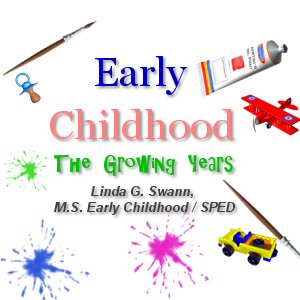Social Growth
 The last area of development is social/emotional. Of the six domains of early childhood development, (gross motor, fine motor, cognitive, language, self help/adaptive, social/emotional) social/emotional skills are sometimes overlooked by caregivers. We often expect children to behave, or produce, in ways they are not capable. Social and emotional growth follows a pattern. Early childhood specialist have defined stages of social and emotional growth. Erikson (Psychoanalysis) defines eight stages of psychosocial crises. The ages are not exact, but rather a guide, as each child is different.
The last area of development is social/emotional. Of the six domains of early childhood development, (gross motor, fine motor, cognitive, language, self help/adaptive, social/emotional) social/emotional skills are sometimes overlooked by caregivers. We often expect children to behave, or produce, in ways they are not capable. Social and emotional growth follows a pattern. Early childhood specialist have defined stages of social and emotional growth. Erikson (Psychoanalysis) defines eight stages of psychosocial crises. The ages are not exact, but rather a guide, as each child is different.
• Stage 1. Basic trust (ages 0 – 2): In this stage the child learns basic trust. The well nurtured and loved child develops trust and feels secure in his world. A child deprived of love and nurturing will become distrustful of everything and insecure.
• Stage 2. Autonomy (ages 2 – 4): During this stage, the child is developing his/her independence, understanding pride, shame and personal will. During this time, a perfectly behaved child develops behaviors that include tantrums, stubbornness and negativism. The word “no” is ever present in the vocabulary. Never fear, it is just a stage. Your child should emerge from this stage more confident, and self assured, taking initiative in beginning and completing tasks.
• Stage 3. Purpose (ages 3 – 5): These are the preschool years, the time to develop an imagination, play cooperatively, and lead, as well as follow. Erikson believes a child who does not develop these skills will be immobilized by guilt, be fearful, dependent on adults and will always be on the fringe of groups, never able to integrate into the group.
• Stage 4. Competence (ages 6 – 12): Often called the school years, the child develops skills necessary to relate to peers according to social rules. Play becomes much more structured and elaborate, often requiring team work, such as sports. The need for self-discipline increases yearly. If earlier stages have been mastered, the child will emerge industrious, self-motivated and competent in his/her world. The child who is mistrusting, will have doubts about his/her future. The guilt and shame filled child will believe they are inferior, expecting to be defeated.
• Stage 5. Fidelity (ages 13 – 20): These are the adolescence years, and by this time most can answer the question of who they are, but will still be experiencing some self-doubts and rebellion. Erikson also believes, when the adolescent emerges successfully from this stage, he/she has self-certainty, anticipates achievement, seeks leadership, and clear sexual identity is established. When growth is retarded in this stage, the adult is self-conscious, negative and paralyzed by feelings of inferiority.
• Stage 6. Love: Love vs. isolation involves learning to experience true intimacy needed for marriage.
• Stage 7. Care: Care vs. self-absorption involves generativity and is needed in marriage and parenthood. Generativity is a concern for people other than oneself and family that usually develops during middle age and involves a need to nurture and guide younger people and contribute to the next generations.
• Stage 8: Wisdom: All other seven stages must be developed to reach stage 8. The mature adult will have integrity, trust, be independent, work hard and have defined roles. He/she will have a good self-concept, can be intimate and is proud of accomplishments. If one or more of the earlier stages are not resolved, he/she may view self and life with disgust and despair.
Next week we will discuss ways to help children successfully complete these stages.









